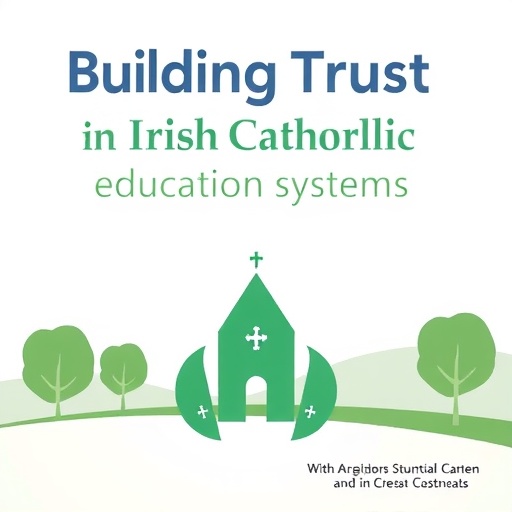The landscape of Catholic education in Ireland is undergoing a transformative phase, particularly with the emergence of lay trust bodies. In a groundbreaking study conducted by researchers A. Meehan and B. Feehan, titled “Find common ground or disappear: the development and impact of lay trust bodies for Catholic education in Ireland,” the implications of these innovative structures are thoroughly examined. This research highlights the necessity of establishing trust among diverse educational stakeholders, particularly in a rapidly evolving societal context.
Lay trust bodies have been introduced as solutions to address concerns regarding governance, inclusivity, and the overall mission of Catholic education. The research meticulously discusses how these bodies are primarily composed of lay individuals who are not part of the clergy, hence bringing fresh perspectives and approaches to the governance of Catholic educational institutions. This evolution is significant in a landscape that is increasingly scrutinizing the role of religious organizations in public education systems.
One of the critical arguments presented in the study is the enhancement of transparency that lay trust bodies offer. Historically, the management of Catholic schools was largely in the hands of ecclesiastical authorities, resulting in a lack of accountability and public engagement. By incorporating laypersons into the governance structure, schools can potentially increase their responsiveness to community needs, foster a sense of ownership among parents and educators, and form collaborative partnerships that enrich the educational experience for students.
The authors further delve into the significance of shared governance, which is essential in today’s context where educational outcomes are closely linked to community involvement. By empowering lay members to actively participate in decision-making processes, these trust bodies cultivate a sense of belonging and identity within the school community. As such, the potential for shared vision and mission becomes more pronounced, which is essential for the sustained growth of Catholic education.
Additionally, the study examines the sociocultural dynamics at play within these trust bodies. Given the diversity of backgrounds represented, lay entities are uniquely positioned to bridge gaps and promote dialogue among different community factions. This dialogue is not merely an academic exercise but a necessary component of fostering trust and understanding in a pluralistic society. The ability to navigate various cultural perspectives will ultimately lead to a richer educational environment, where students learn not just academic content but also the values of empathy and collaboration.
Moreover, the research touches on the challenges that accompany the establishment of lay trust bodies. While the advantages are significant, the transition from a clerical governance model to a lay-led one is fraught with potential pitfalls. Resistance from traditionalists who were accustomed to conventional hierarchies is a considerable barrier. Furthermore, the study anticipates tensions that may arise from differing interpretations of Catholic identity and mission, posing questions about fidelity to doctrine versus the need for progressive educational practices.
The positive impact of these changes is also illustrated through case studies of schools in Ireland that have successfully adopted lay trust structures. These examples serve to inspire and motivate other institutions considering similar governance changes. The case studies highlight innovative practices that have emerged, demonstrating how lay trust bodies have not only improved administrative efficiency but have also enriched the spiritual dimension of education in schools.
As these trust bodies continue to evolve, the ongoing relationship between faith and education in Ireland will be put to the test. The integration of lay perspectives offers a crucial opportunity to redefine what it means to be a Catholic school in contemporary society. This ongoing dialogue will be essential in ensuring that Catholic education not only survives but thrives in an increasingly secular world.
Furthermore, the authors advocate for robust training programs designed for lay trust members, ensuring they are equipped with the necessary skills to navigate governance challenges effectively. Increasing their capacity to understand educational policies, community engagement strategies, and organizational management is fundamental to the success of lay trust bodies. The authors argue that preparation in these areas is crucial for overcoming the inherent uncertainties faced in a rapidly changing educational landscape.
In conclusion, Meehan and Feehan’s research provides a significant contribution to discussions surrounding educational governance in Ireland. Their findings underscore the importance of adaptability and innovation within Catholic educational frameworks amidst modern societal changes. As Catholic schools strive to remain relevant and impactful, the study illuminates the pathway forward through lay trust bodies. By finding common ground in governance, these entities hold the potential not only to strengthen Catholic education but also to ensure its continued relevance in the face of immense change.
This research not only emphasizes the need for collaboration in Catholic education but also sets forth a compelling argument for a more inclusive approach to governance. It invites stakeholders to reconsider their roles and responsibilities concerning the education of future generations. The future of Catholic education in Ireland may well hinge on the success of these innovative governance models.
Subject of Research: The emergence and impact of lay trust bodies in Catholic education in Ireland.
Article Title: ‘Find common ground or disappear’: the development and impact of lay trust bodies for Catholic education in Ireland.
Article References:
Meehan, A., Feehan, B. ‘Find common ground or disappear’: the development and impact of lay trust bodies for Catholic education in Ireland.
j. relig. educ. (2025). https://doi.org/10.1007/s40839-025-00274-3
Image Credits: AI Generated
DOI: https://doi.org/10.1007/s40839-025-00274-3
Keywords: Catholic education, governance, lay trust bodies, community involvement, transparency, education reform, Ireland.




